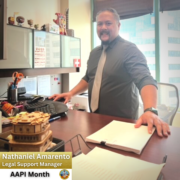San Diego County District Attorney Summer Stephan announced today that two members of the DA’s Office were recognized by Mothers Against Drunk Driving (MADD) at the annual MADD San Diego Law Enforcement and Prosecutor Recognition Awards held Thursday, June 8 at the Balboa Park Recital Hall. Deputy District Attorney Hailey Williams was named Prosecutor of the Year for her work in the DA’s DUI Homicide Unit. Victim Advocate Shanda Torres was recognized with the MADD Outstanding Advocate Award for her work with victims of DUI cases.
 “I want to thank Mothers Against Drunk Driving for their years of advocacy and education on the harm and loss that driving under the influence causes,” said DA Stephan. “This recognition by MADD of Deputy District Attorney Hailey Williams as Prosecutor of the Year and DA Victim Advocate Shanda Torres as Outstanding Advocate is very special to our entire DA team that fights for justice on behalf of crime victims and our community. Unfortunately, DUI homicides have increased in recent years, resulting in the tragic deaths of far too many in our community. Prosecutors like Hailey are helping to deliver a level of justice for the victims and their families, along with the compassionate assistance of Victim Advocates like Shanda. I am very proud to have them both on our team and I know that this award is very well-deserved. I also want to offer our thanks and congratulations to all the other awardees that are making a difference.”
“I want to thank Mothers Against Drunk Driving for their years of advocacy and education on the harm and loss that driving under the influence causes,” said DA Stephan. “This recognition by MADD of Deputy District Attorney Hailey Williams as Prosecutor of the Year and DA Victim Advocate Shanda Torres as Outstanding Advocate is very special to our entire DA team that fights for justice on behalf of crime victims and our community. Unfortunately, DUI homicides have increased in recent years, resulting in the tragic deaths of far too many in our community. Prosecutors like Hailey are helping to deliver a level of justice for the victims and their families, along with the compassionate assistance of Victim Advocates like Shanda. I am very proud to have them both on our team and I know that this award is very well-deserved. I also want to offer our thanks and congratulations to all the other awardees that are making a difference.”
In 2022, the DA’s DUI Homicide Unit prosecuted 27 cases and so far in 2023, there have been 8 cases. Recipients of these awards are chosen through MADD’s call for nominations process. The organization reaches out to community partners, law enforcement agencies, local officials and their internal victim advocates asking them to nominate individuals who stand out in the community with regards to DUI-related work. Every year, MADD honors law enforcement officials for their continuous efforts in driving under the influence enforcement. This year, in person, the event recognized law enforcement with awards for the number of DUI arrests made annually. According to MADD, each arrest is a life saved and MADD awards their service as they dedicate their lives to keeping our roads safe.
“We are honored to acknowledge prosecutors and advocates from the San Diego County District Attorney’s Office,” said Patricia Rillera, California State Executive Director for MADD. “MADD San Diego appreciates the meaningful opportunities to collaborate with the San Diego DA’s Office as we work towards a day of no more victims.”
 Deputy DA Hailey Williams was nominated by Deputy DA Laura Evans of the DA’s DUI Homicide Unit. Williams started prosecuting DUI homicide cases in 2019, when she was assigned to assist the unit as the numbers of DUI-related deaths in San Diego were on the rise. Despite maintaining a general felony case load in addition to DUI cases, Hailey welcomed the role and excelled in it. She has handled 10 or more of these tragic, serious cases, sentencing many defendants to multiple years in state prison. For instance, in 2022, Hailey went to trial on a difficult gross vehicular manslaughter case in which the defendant was high on methamphetamine and killed his passenger. Hailey’s skills at presenting the facts of her case and cross-examining defense witnesses resulted in a guilty verdict on every charge within a day of deliberations.
Deputy DA Hailey Williams was nominated by Deputy DA Laura Evans of the DA’s DUI Homicide Unit. Williams started prosecuting DUI homicide cases in 2019, when she was assigned to assist the unit as the numbers of DUI-related deaths in San Diego were on the rise. Despite maintaining a general felony case load in addition to DUI cases, Hailey welcomed the role and excelled in it. She has handled 10 or more of these tragic, serious cases, sentencing many defendants to multiple years in state prison. For instance, in 2022, Hailey went to trial on a difficult gross vehicular manslaughter case in which the defendant was high on methamphetamine and killed his passenger. Hailey’s skills at presenting the facts of her case and cross-examining defense witnesses resulted in a guilty verdict on every charge within a day of deliberations.
Given Hailey’s success and passion for these cases, she has been assigned many of them, including Watson murder cases with significant and tragic facts. Not only does Hailey excel in the prosecution of these cases, but she is exemplary when it comes to her empathy with the family members that have lost loved ones because of a defendant’s decisions. Despite her hectic case load and the court time that these cases require, Hailey makes it a point to keep in consistent contact with all next-of-kin, informing them every step of the way and providing them direct access for any questions. Her caring nature allows families to trust her with bringing justice to their loved one. Hailey is also part of the training team for new Deputy DAs, specifically organizing and presenting a day-long training on DUIs to the new classes.
 Victim Advocate Shanda Torres was nominated for the award by MADD San Diego Victim Service Specialist Nicole Jupiter for her ability to assist with Spanish speaking families and being a helpful resource for MADD, responding promptly any time the organization inquires about a case.
Victim Advocate Shanda Torres was nominated for the award by MADD San Diego Victim Service Specialist Nicole Jupiter for her ability to assist with Spanish speaking families and being a helpful resource for MADD, responding promptly any time the organization inquires about a case.
Other award recipients were Deputy City Attorney Ryan Harris of the San Diego City Attorney’s Office, who was also awarded Prosecutor of the Year; Chief Deputy City Attorney Kristen Foster of the San Diego City Attorney’s Office, who was also awarded MADD Outstanding Advocate Award; CHP San Diego’s Sergeant Brian Pennings, Officer Gilberto Jacobo, Officer Jake Sanchez and Officer Juan Escobar, who were all awarded for Outstanding Agency Dedication; San Diego Police Officer Anthony Carrasco and SDPD Officer Joseph Cabrales, El Centro Police Officer Daniel Valencia and La Mesa Police Officer Jesse Neumeister were all awarded the Outstanding Rookie Award; the MADD Century Award went to Carlsbad Police Officer Tyler Hubka, who made 101 DUI arrests, Carlsbad Police Officer Ricardo Huerta, who made 125 DUI arrests, and San Diego Sheriff’s Deputy Jason Malson, who made 115 DUI arrests; and finally the MADD Top Cop awardee was Escondido Police Officer Timothy Hamilton who made 212 DUI arrests.




 “I want to thank Mothers Against Drunk Driving for their years of advocacy and education on the harm and loss that driving under the influence causes,” said DA Stephan. “This recognition by MADD of Deputy District Attorney Hailey Williams as Prosecutor of the Year and DA Victim Advocate Shanda Torres as Outstanding Advocate is very special to our entire DA team that fights for justice on behalf of crime victims and our community. Unfortunately, DUI homicides have increased in recent years, resulting in the tragic deaths of far too many in our community. Prosecutors like Hailey are helping to deliver a level of justice for the victims and their families, along with the compassionate assistance of Victim Advocates like Shanda. I am very proud to have them both on our team and I know that this award is very well-deserved. I also want to offer our thanks and congratulations to all the other awardees that are making a difference.”
“I want to thank Mothers Against Drunk Driving for their years of advocacy and education on the harm and loss that driving under the influence causes,” said DA Stephan. “This recognition by MADD of Deputy District Attorney Hailey Williams as Prosecutor of the Year and DA Victim Advocate Shanda Torres as Outstanding Advocate is very special to our entire DA team that fights for justice on behalf of crime victims and our community. Unfortunately, DUI homicides have increased in recent years, resulting in the tragic deaths of far too many in our community. Prosecutors like Hailey are helping to deliver a level of justice for the victims and their families, along with the compassionate assistance of Victim Advocates like Shanda. I am very proud to have them both on our team and I know that this award is very well-deserved. I also want to offer our thanks and congratulations to all the other awardees that are making a difference.” Deputy DA Hailey Williams was nominated by Deputy DA Laura Evans of the DA’s DUI Homicide Unit. Williams started prosecuting DUI homicide cases in 2019, when she was assigned to assist the unit as the numbers of DUI-related deaths in San Diego were on the rise. Despite maintaining a general felony case load in addition to DUI cases, Hailey welcomed the role and excelled in it. She has handled 10 or more of these tragic, serious cases, sentencing many defendants to multiple years in state prison. For instance, in 2022, Hailey went to trial on a difficult gross vehicular manslaughter case in which the defendant was high on methamphetamine and killed his passenger. Hailey’s skills at presenting the facts of her case and cross-examining defense witnesses resulted in a guilty verdict on every charge within a day of deliberations.
Deputy DA Hailey Williams was nominated by Deputy DA Laura Evans of the DA’s DUI Homicide Unit. Williams started prosecuting DUI homicide cases in 2019, when she was assigned to assist the unit as the numbers of DUI-related deaths in San Diego were on the rise. Despite maintaining a general felony case load in addition to DUI cases, Hailey welcomed the role and excelled in it. She has handled 10 or more of these tragic, serious cases, sentencing many defendants to multiple years in state prison. For instance, in 2022, Hailey went to trial on a difficult gross vehicular manslaughter case in which the defendant was high on methamphetamine and killed his passenger. Hailey’s skills at presenting the facts of her case and cross-examining defense witnesses resulted in a guilty verdict on every charge within a day of deliberations. Victim Advocate Shanda Torres was nominated for the award by MADD San Diego Victim Service Specialist Nicole Jupiter for her ability to assist with Spanish speaking families and being a helpful resource for MADD, responding promptly any time the organization inquires about a case.
Victim Advocate Shanda Torres was nominated for the award by MADD San Diego Victim Service Specialist Nicole Jupiter for her ability to assist with Spanish speaking families and being a helpful resource for MADD, responding promptly any time the organization inquires about a case.





